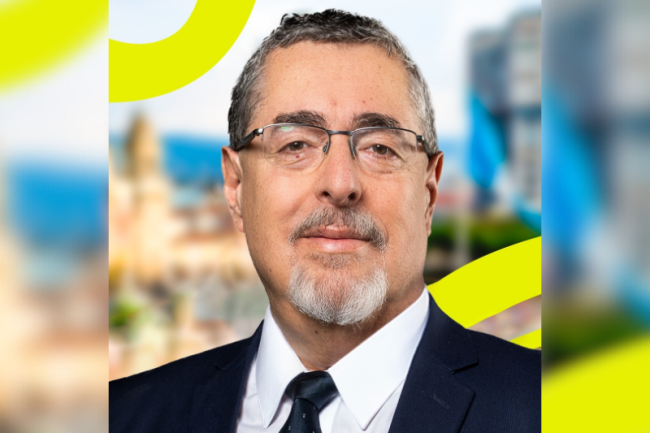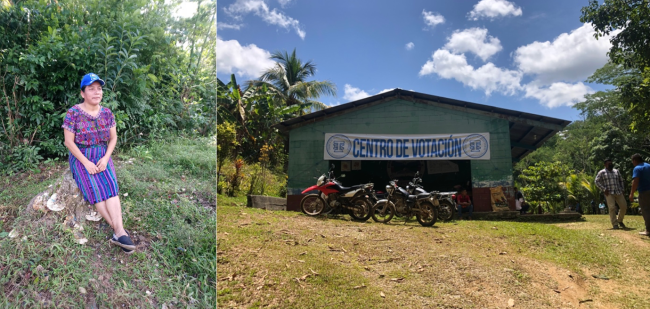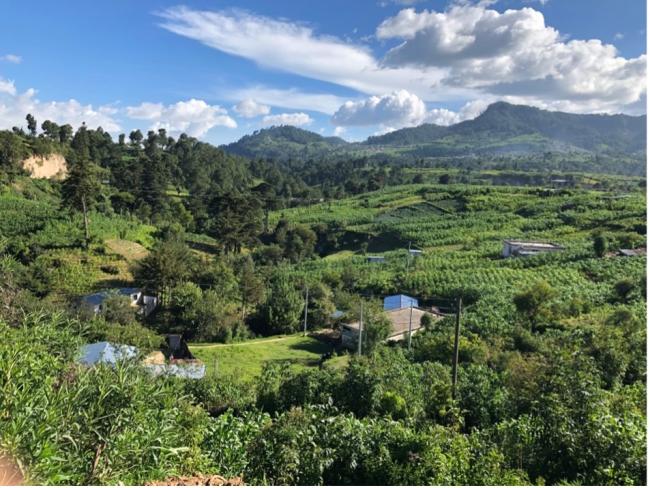
Leer este artículo en español.
Guatemalans flocked to public squares all over the country as results came in on August 20, waving the country’s sky-blue flags and setting off fireworks late into the night. Chanting “Sí se pudo” or “Yes, we could” and singing the national anthem, they celebrated the victory of a new president that few expected would rise to the top before the first round of voting on June 25. "We are going towards a new spring," president-elect Bernardo Arévalo of the Movimiento Semilla party said in a statement the day after the election. "No one can prevent the will of the people of Guatemala."
Ronalth Ochaeta Aguilar, who has been part of Semilla since 2017 and was elected on June 25 to represent the department of Guatemala in Congress, described a grueling campaign. Although “it was very low cost (financially)," he said, "it was done with lots of heart, effort, and determination” on the part of the entire Semilla team. Arévalo's unexpected showing in the first round, Ochaeta recalled, brought an explosion of “total joy.” He repeated what has become a slogan on social media: “Nadie nos vió venir”—nobody saw us coming.
In June, I wrote about the “shadows of the past” hanging over Guatemala’s elections. On August 20, those clouds parted, giving way to what many are calling a second Guatemalan spring. Arévalo and his vice-presidential running mate Karin Herrera won 58 percent of the vote—an astounding margin against the allegedly corrupt establishment candidate, Sandra Torres of the National Unity of Hope (UNE). Arévalo and Herrera hope to usher in a new period of prosperity and democracy for the country, which has been battered by democratic backsliding and intensifying migration movement in recent years.
A First-Round Upset
Arévalo stunned Guatemala when he and Herrera won 12 percent of the vote in the June general election and advanced to the runoff, which he went on to handily win. After polling around 2 percent ahead of the first-round vote, Arévalo shot up to finish in second place, reflecting widespread discontent with the entrenched corruption that has become the status quo in Guatemala. Arévalo, however, is more than a surprise candidate who is trying to reign in corruption. He is also the son of Juan José Arévalo, Guatemala’s first democratically elected president (1945-1951). Arévalo seeks to fulfill his late father’s democratic legacy. His party, Semilla, and their logo—a green sprout—gestures to the return of the Guatemalan Spring (1944-1954), a period of democratic governance that came to a dramatic end with a U.S.-backed coup that threw the country into decades of brutal civil war.
While Semilla dominated in most of the country in the August 20 election, winning 17 of 22 departments, UNE's Torres performed well in rural areas, showing the party’s continued strength in historically marginalized areas. She is remembered from her time as first lady (2008-2012), when she oversaw a popular anti-poverty program that distributed basic supplies to rural communities. But while Torres first emerged as a social democrat, she has veered to the right in recent years, focusing her 2023 campaign on an anti-LGBTQ and anti-abortion platform.
Semilla, on the other hand, leaned heavily on the youth vote in urban areas. Their campaign also leveraged social media, embracing the green sprout emoji. Supporters even took to calling their candidate Tío Bernie, referencing both the outsider status and the shared name with U.S. Senator Bernie Sanders of Vermont. In the second round, Semilla triumphed in many departments, winning 68.8 percent of the vote in the department of Quetzaltenango, 74.9 percent of the vote in the department of Guatemala, and 82.3 percent of the vote in Sacatepéquez. Despite the party’s urban, mestizo base, Arévalo’s resounding victory suggests the emergence of a democratic popular front.

Ana López, a Mam lawyer, traveled more than 18 hours from Guatemala City to her hometown in Santa María Tzejá, Ixcán to cast her ballot. "Semilla’s results during the first round of voting are due to the efforts of the mestizo youth of the capital, who rebelled against the traditional corrupt government," she told me. "However, many different social sectors united for the runoff, including Indigenous peoples, campesinos, Indigenous women, and rural groups. This unity coalition was what carried [Arévalo and Herrera] to the presidency.”
Indigenous Participation in the New Administration
López insists that regardless of Arévalo’s and Semilla’s best intentions, the path to a new Guatemala must meaningfully integrate the four peoples or pueblos cohabitantes of Guatemala—Maya, Garifuna, Xinca, and Ladino—into the planning and execution of state and development projects. Otherwise, the transformative promise of the new government will not be able to mature into a truly inclusive democracy.
In an interview with Americas Quarterly, journalist and anthropologist Irma A. Velásquez Nimatuj echoed this sentiment: “One of Arévalo’s critical challenges will be whether he can put Indigenous peoples at the center of his reforms to create a true alternative to the inequality that structural racism has subjected them to.”

Roberto—a young K’iche’ man from Nahualá, Sololá—voted for Semilla in both the first round and the runoff. He echoed the opportunity and challenges presented by the election. The runoff results “are one more piece of evidence of a marginalized people who have been stripped of their rights and are tired of so much corruption," he said. "[They] are expressing their opposition to corruption in a peaceful manner at the ballot box, [which] has created an incredible opportunity.” Although Roberto is cognizant of the many barriers Arévalo faces to taking office and to governing, he calls the election a “big win for democracy” and hopes that Semilla can create a “more inclusive state.”
Ongoing Uncertainty amid Threats to the Democratic Process
In the lead-up to the runoff, Guatemala’s elites tried to disqualify Arévalo and his party from the election. These efforts have continued in the wake of the second round. These developments come on the heels of a turbulent campaign season in which three leading presidential candidates were excluded from the race. In the days after the first round, and before legal challenges began, some noted that Arévalo would not have been allowed to run if the establishment thought he could actually win. The race continues to be marred by what many have called “extreme judicialization” or political lawfare, in which the courts played an active role in shaping the election.
Torres, a three-time presidential candidate and former first lady, has yet to concede defeat. She has since locked her verified X account, which had been actively posting until the runoff. President Alejandro Giammattei acknowledged the election in a message on X the night of the runoff. Yet he stopped short of fully embracing the results. “I have spoken with Arévalo to congratulate him and invite him to the Presidential House the day after the results are verified," he wrote (emphasis added), "to plan the most orderly and thorough presidential transition this country has yet experienced. He thanked me and accepted.” Days after the election, the results have yet to be certified.
According to Semilla's Ochaeta, the attacks on Arévalo and the party from the Public Prosecutor's office "do not have any legal basis." “Semilla colleagues were forced into exile," he said. "The political persecution and dirty tactics did not stop throughout the runoff campaign, but they did not work because citizens flooded the streets in support of the electoral process as well as the results.” Still, a long road remains until the January 14 transition.
The Public Prosecutor's office, which is controlled by allies of the current administration, made another attempt to suspend Semilla’s status as a political party days after the second round while also escalating attacks on the Supreme Electoral Tribunal (TSE).
While these legal maneuvers since the runoff haven’t been as vicious as feared, risks of violence have escalated. On the afternoon of August 24, the Inter-American Commission on Human Rights (IACHR) denounced two separate assassination plots against Arévalo and Herrera and implored the Guatemalan state to take appropriate measures to "guarantee the rights" and lives of the president and vice president-elect. According to the IACHR resolution, one assassination plan was code-named “Colosio” after the Mexican presidential candidate of the same name who was assassinated in March 1994. Reports indicate that state agents were behind the plan. These threats reflect a grave risk of political violence and are particularly shocking in light of the recent assassination of Ecuadorian presidential candidate Fernando Villavicencio.
For people all over Guatemala, including López and Roberto, Semilla represents renewed hope that all Guatemalans can live a dignified life. As López told me: “Semilla’s victory is in fact that of the Guatemalan people.” As for Ochaeta, he recognizes the opportunity and responsibility he and Semilla as a whole now hold. “We have a duty to the people who dream of a new country and a government that can begin to respond to its problems," he said. "Being elected…is the highest honor of my life, but also comes with a great responsibility to fulfill the task at hand and represent Guatemala in a dignified way.”
Ongoing threats from Guatemala’s ruling elite, both through political lawfare and through physical violence, demonstrate the tenacity of existing power structures and the immense promise of Semilla’s growing coalition.
Emily Taylor is a PhD candidate in Latin American History at UNC Chapel Hill. She is currently based in Guatemala City, Guatemala on a Fulbright Hays DDRA Fellowship.

